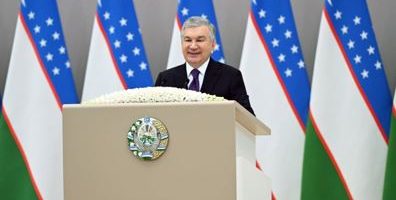SCO must shun bloc politics: Imran

The premier says addressing the threats to int’l and regional peace are a vital interest for SCO
Centreline Report
DUSHANBE: Prime Minister Imran Khan on Friday called upon the regional countries to “resist any drift towards bloc politics” and stressed pursuing the approach of peaceful coexistence.
“Peaceful coexistence and cooperation – not confrontation, should be the main drivers of global politics,” he said in his address at the 20th Shanghai Cooperation Organization (SCO) Council of Heads of State meeting, held in the capital of Tajikistan.
The summit gathered the Presidents of Tajikistan, Uzbekistan, Kyrgyzstan, Kazakhstan, Iran, the leaders of observer states, foreign ministers, and the heads of international and regional organizations.
Vladimir Norov, SCO Secretary General and Jumakhon Giyasov, Director Executive Committee of SCO Regional Anti-Terrorist Structure were also present.
The prime minister said addressing the threats to international and regional peace and security was a vital interest for SCO.
He said the fight against terror would not be won if such threats and challenges were ignored, with state-terrorism being the biggest one, perpetrated against people living under foreign occupation in disputed territories.
“In some cases, such extremist and bigoted ideologies have ascended to capture the state power in so-called democracies,” he said.
Imran Khan said Pakistan believed that faithfully implementing UN Security Council resolutions for peaceful settlement of outstanding disputes was a necessary condition for peace, and indispensable for creating an environment of cooperation.
Prime Minister Imran Khan took the opportunity to speak on his favorite topic of Climate change and termed it yet another existential threat that the planet earth faces.
He said Pakistan’s contribution to global emissions was negligible, yet it was among the 10 most vulnerable countries and therefore addressing the issue was a key priority of his government.
“We have taken a number of flagship initiatives to mitigate its adverse impacts, including the 10 Billion Tree Tsunami project.
“Our initiatives for ‘Clean and Green Pakistan’ not only aim to protect nature and restore eco-systems but also expand eco-tourism and create thousands of new jobs for our youth.
“We are also committed to shifting our energy mix towards a clean and low carbon trajectory and are targeting 60 percent of our energy to be clean by 2030”, he added.
Imran Khan said Pakistan continues to work with the international community towards comprehensive implementation of the Paris Agreement and mobilization of enhanced international climate finance to achieve shared objectives.
REGIONAL CONNECTIVITY
The Prime Minister said sustainable peace and stability in Afghanistan would also help realize Pakistan’s vision of an inter-connected, prosperous and economically vibrant region. He said Pakistan has shifted its focus from geo-politics to geo-economics.
“Our new economic security paradigm has three central pillars: peace, development partnerships, and connectivity.”
He said Pakistan’s geo-strategic location as a natural bridge connecting Central Asia with South Asia finds its manifestation through the platform of SCO. Imran Khan pointed that Pakistan offers the shortest route to the sea for many of our partners in Central Asia.
“I commend the initiative by the President of Uzbekistan to host the International Conference on Central Asia-South Asia Connectivity in Tashkent last July.”
He was optimistic that the web of rail, road, sea and air links across the SCO region would usher in a new era of enhanced trade, energy flows, and people-to-people exchanges, and added that this connectivity would contribute significantly to progress and prosperity in the region and beyond.
These trans-regional linkages will be reinforced by the China-Pakistan Economic Corridor (CPEC), the flagship project of BRI, which he added was making steady progress.
SCO:
Imran Khan termed the 20th anniversary of SCO an important juncture to reflect its journey so far and guided by the “Shanghai Spirit”, the organization had steadily grown in size and stature.
He said that today, SCO cumulatively represented 44 per cent of the world’s population, 25 per cent of global landmass, and 20 per cent of the global GDP. He said impressive progress has been made in strengthening SCO’s normative and institutional basis, and in developing practical cooperation on SCO’s twin planks of security and socio-economic development.
The Prime Minister also proposed a five-point way forward on the SCO:
One, “We must reaffirm our complete support for effective multilateralism and the purposes and principles of the UN Charter, including equality and sovereignty of states, respect for territorial integrity, non-aggression, non-use or threat of force, and peoples’ right for self-determination.
Two, “We must strengthen our collective endeavors to mitigate the adverse economic impact of the Covid-19 pandemic, including through the SCO Joint Advisory measures.
Three, “We must chart out a coordinated SCO approach towards stabilizing the situation in Afghanistan — including through enhanced engagement to address our common concerns and safeguard our shared interests, steps to provide humanitarian support and ensure economic stability, and measures to enable Afghanistan to become a reliable partner in peace and prosperity.
Four, “We must advance the agenda of regional connectivity. In this regard, taking the process forward, Pakistan would like to host a conference on the theme “Transport Connectivity for Regional Prosperity” in a virtual mode in 2022.
Five, “We must, recognizing the immense potential of our youth, explore all possible avenues for their increased interface and empowerment. Pakistan would like to host a conference on “Youth Empowerment through Digital Economy” in 2022.” Prime Minister addressed President Raisi of Iran as “my brother” and congratulated the country on admission to SCO as full member. He also congratulated Saudi Arabia, Egypt and Qatar on joining as new Dialogue Partners.
He congratulated Secretary General Norov on the successful completion of his term and welcomed Ambassador Zhang Ming as the new Secretary-General. He congratulated President Shavkat Mirziyoyev on Uzbekistan’s Chair of SCO for 2021-2022 and assured him of Pakistan’s full support.
Earlier on his arrival at Nauroz palace – the venue of the SCO meeting, the prime minister was warmly received by Tajikistan’s President Emomali Rahmon.
At the welcome ceremony, PM Imran Khan and other participating leaders of SCO member states had a group photograph with President Emomali, the head of the host country.
Foreign minister Shah Mahmood Qureshi, Information Minister Chaudhry Fawad Hussain, National Security Adviser Dr Moeed Yusuf and Foreign Secretary Sohail Mahmood attended the session.
The SCO, an eight-member permanent inter-governmental trans-regional Organization, was established in Shanghai on 15 June 2001. Pakistan became an SCO Observer in 2005 and a full member in June 2017 during Astana SCO-CHS Summit. Russia, China, India, Uzbekistan, Kazakhstan, Kyrgyz Republic and Tajikistan are other SCO members.
The SCO also has four Observer states (Iran, Mongolia, Belarus and Afghanistan) and six Dialogue Partners (Azerbaijan, Armenia, Cambodia, Nepal, Turkey and Sri Lanka).
The Prime Minister’s visit is part of Pakistan’s deepened engagement with Central Asia through ‘Vision Central Asia’ policy, having revitalized focus in five key areas of political ties, trade and investment, energy and connectivity, security and defence, and people-to-people contacts.
Related News

2026 to become fundamental in developing all spheres: President Shavkat Mirziyoyev
TASHKENT, DEC 26 /DNA/ – President Shavkat Mirziyoyev of Uzbekistan delivered his annual State of theRead More

Urbanisation – The Azerbaijan Model
By Ansar Mahmood Bhatti President of Azerbaijan Ilham Aliyev has signed an order declaring 2026Read More


Comments are Closed